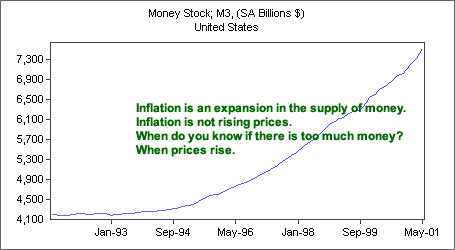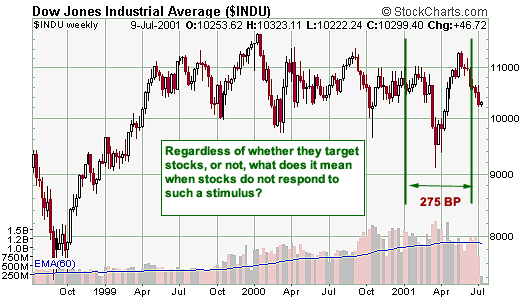Sooner
or later, the matter of central banking will again come up for
review. But not until we have come to that day when people wonder,
just to what end does a central bank function in their interests?
Under
Greenspan's reign, the Federal Reserve banks have acquired control
of so many markets that the entire financial system might as
well become nationalized. Legions of brokers now work as asset
gatherers rather than customers' men, who had traditionally
built their reputation on working only for, well, the customer.
In view of this new order, which affects just about every one
on this planet with a bank account, there is perhaps no better
timing for this quote except of course (the era) from whence
it came:
Mankind
soon learns to make interested uses of every right and power,
which they possess, or may assume. The public money and public
liberty... will soon be discovered to be sources of wealth and
dominion to those who hold them; distinguished, too, by this
tempting circumstance, that they are the instrument, as well
as the object of acquisition.
Thomas
Jefferson (Notes on Virginia, 1784)
The
Real Estate and Mortgage business are next on the Fed's agenda.
We've already discussed that in Nominal Net Worth (May 2001).
Maybe
one day mankind will again know that each time they ask
for help, particularly from their own government, it will ultimately
cost certain essential liberties. The layman today believes
that the Federal Reserve System exists in order to protect,
or guarantee, his and/or his government's money. Does he or
she stop to think of how the FRB gets its wherewithal? How it,
as custodian of the public money, uses inflation of the public
money today in order to both, gain his trust and redirect his
savings.
Maybe
this would be easier to see if the help came from a foreign
government, for our own government evidently doesn't charge
for this service.
I
saw a T.V. movie about the 1929 stock market crash once, where
Jesse Livermore (Reminiscences of a Stock Operator) was
in an interview with a reporter, about his bearish market view.
The reporter asked, "but sir, I have affidavits from the
CEO's of over 100 of the country's biggest blue chip companies
that their shares are in fact undervalued."
I
don't know if that was actually said or not. The point though
is that today, we have to laugh at that. I mean I'm holding
my side from the ache of my laughter at the thought of Ron Insana
waving such a document on the air at CNBC.
However,
the laughter stopped when I realized that such a document does
indeed exist. Though the nation's business leaders, whom we
might have considered to be the icons of a past era, do not
sign it. On the contrary, today, the Federal Reserve Bank of
Minneapolis does. But the report is called a research paper
instead of an affidavit, and it is called:
The
Stock Market: Too High? Too Low? Just Right.
In
the June (2001) report, two Fed economists argue why stock prices
are not too high, or too low, but just right, and fully justified
by theory. Here is their conclusion about early 2000:
The
market was not exhibiting irrational stockholder behavior, but
instead providing a very good indication of the value of corporate
assets.
We
will have a closer look at their arguments further below. But
what does that say about the state of the union? Is it capitalism
that is responsible for the boom of the late nineties, or is
it the Fed? The answer lies in what analysts avoid talking about
the most, I think. What is it that is the most obvious reason
for the rise in asset values, and which is the least discussed?
Inflation. And when it is discussed, it is only discussed in
terms of the FRB's affidavit that there is no
inflation.

Why
does industry need a central banking organization to tell them
what value is the correct value for the market if it is not
part of the industry? Ironically, however, just as the stock
market crash of 1929 quickly destroyed the credibility and the
public's trust in the nation's business leaders, I think we
may see one day how this document and the obstinate dogma of
the FRB on matters related to the already controversial productivity
debate, too are only as good as the paper they're currently
printed on.
I
suppose that it will not be until the day when the FRB cannot
deliver on its promise of safety then that all hell will break
loose. And now, with the stock market hovering atop an affidavit
(or the like) commissioned by members of the FRB, which swears
that the market is priced fairly, how far could that day be?
Consider
that the FOMC just sprayed financial markets with more force
than ever - slashing interest rates by 2.75 percent, or by roughly
half of what they were.

So
what is it going to do when the stock market falls for real
this week? Go to zero? Long before then, for unlike Japan the
United States is now a net debtor (one of the consequences of
forsaking its liberties?), investors will likely recognize that
there is no more that the FRB can do to prevent the inevitable.